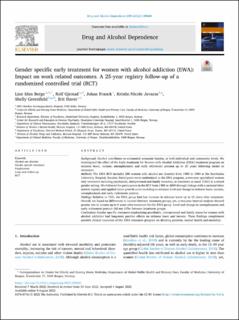| dc.contributor.author | Berge, Line Iden | |
| dc.contributor.author | Gjestad, Rolf | |
| dc.contributor.author | Franck, Johan Petter | |
| dc.contributor.author | Javaras, Kristin Nicole | |
| dc.contributor.author | Greenfield, Shelly | |
| dc.contributor.author | Haver, Brit | |
| dc.date.accessioned | 2022-09-22T07:57:01Z | |
| dc.date.available | 2022-09-22T07:57:01Z | |
| dc.date.created | 2022-09-15T13:51:37Z | |
| dc.date.issued | 2022 | |
| dc.identifier.issn | 0376-8716 | |
| dc.identifier.uri | https://hdl.handle.net/11250/3020531 | |
| dc.description.abstract | Background: Alcohol contributes to substantial economic burden, at both individual and community levels. We investigated the effect of the Early treatment for Women with Alcohol Addiction (EWA) treatment program on sickness leave, income, unemployment and early retirement pension up to 25 years following intake to treatment.
Methods: The EWA RCT included 200 women with alcohol use disorder from 1983 to 1984 at the Karolinska University Hospital, Sweden. Participants were randomized to the EWA program, a two-year specialized woman only treatment including psychiatric, interpersonal and family concerns, or treatment as usual (TAU) in a mixed gender setting. We followed the participants in the RCT from 1985 to 2009 through linkage with a national labor market registry and applied latent growth curve modeling to estimate level and change in sickness leave, income, unemployment and early retirement pension.
Findings: Relative to TAU, the EWA group had less increase in sickness leave up to 21 years after treatment. Overall, we found no differences in income between treatment groups, yet, a two-year interval analysis showed greater rise in income up to 8 years after treatment for the EWA group. Level and change in unemployment and early retirement pension did not differ between treatment groups.
Conclusions: Gender specific treatment emphasizing psychiatric, interpersonal and family issues for women with alcohol addiction had long-term positive effects on sickness leave and income. These findings complement positive clinical outcomes of the EWA treatment program on drinking patterns, mental health and mortality. | en_US |
| dc.language.iso | eng | en_US |
| dc.publisher | Elsevier | en_US |
| dc.rights | Navngivelse 4.0 Internasjonal | * |
| dc.rights.uri | http://creativecommons.org/licenses/by/4.0/deed.no | * |
| dc.title | Gender specific early treatment for women with alcohol addiction (EWA): Impact on work related outcomes. A 25-year registry follow-up of a randomized controlled trial (RCT) | en_US |
| dc.title.alternative | Gender specific early treatment for women with alcohol addiction (EWA): Impact on work related outcomes. A 25-year registry follow-up of a randomized controlled trial (RCT) | en_US |
| dc.type | Journal article | en_US |
| dc.type | Peer reviewed | en_US |
| dc.description.version | publishedVersion | en_US |
| dc.rights.holder | Copyright 2022 the authors | en_US |
| dc.source.articlenumber | 109600 | en_US |
| cristin.ispublished | true | |
| cristin.fulltext | original | |
| cristin.qualitycode | 1 | |
| dc.identifier.doi | 10.1016/j.drugalcdep.2022.109600 | |
| dc.identifier.cristin | 2052067 | |
| dc.source.journal | Drug and Alcohol Dependence | en_US |
| dc.identifier.citation | Drug and Alcohol Dependence. 2022, 239, 109600. | en_US |
| dc.source.volume | 239 | en_US |

